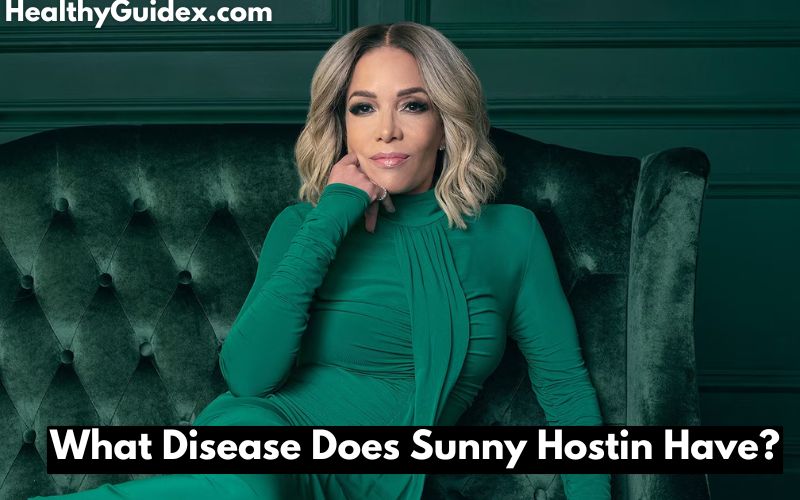Sunny Hostin, celebrated for her sharp legal mind and insightful commentary on The View, has become a household name not just for her professional accomplishments but also for her openness about health-related struggles. While Hostin herself is not publicly known for battling a widely recognized disease, she has been candid about personal and familial health challenges, which have shaped her views on healthcare and advocacy. She has used her platform to promote awareness of women’s health, particularly for women of color, who often face significant healthcare disparities. In this article, we explore Sunny Hostin’s health disclosures, her family’s health history, and her efforts to raise awareness about critical medical issues.
Sunny Hostin’s Health Advocacy and Transparency
Sunny Hostin has consistently emphasized the importance of transparency when it comes to personal health, particularly for women of color who may not always have equal access to healthcare. On The View, she often addresses health-related topics, encouraging viewers to take a proactive role in their health management. She advocates for regular screenings, mental health awareness, and understanding one’s family medical history.
One of Hostin’s key messages is the importance of being an active participant in your own healthcare. She stresses that people, especially women, should not hesitate to seek second opinions or challenge medical professionals if they feel their concerns are not being taken seriously. This approach stems from the broader healthcare inequities that women of color face, where systemic biases can result in misdiagnoses, delayed treatment, or inadequate care. Hostin’s advocacy goes beyond her own experiences, encouraging others to be diligent in advocating for their health.
Hostin’s perspective is unique because she integrates her legal expertise and understanding of systemic issues into her discussions of healthcare. She recognizes that healthcare disparities are not just about access but also about education and empowerment. By promoting transparency and self-advocacy, Hostin is contributing to the larger conversation about how to improve healthcare for marginalized communities.
Health Challenges Faced by Sunny Hostin’s Family
While Hostin herself has not publicly discussed any chronic illness, she has spoken about the health challenges within her family, particularly her mother’s battle with breast cancer. This personal experience had a profound impact on her views regarding cancer awareness and prevention. Hostin has shared how the emotional and physical toll of her mother’s illness influenced her advocacy for regular screenings and early detection.
In addition to her mother’s struggle with breast cancer, Hostin has also spoken about losing her father to complications related to diabetes. This experience reinforced her belief in the importance of preventive care and lifestyle management. Diabetes, especially Type 2 diabetes, disproportionately affects African American and Hispanic communities, often due to genetic predispositions, diet, and other environmental factors. Hostin’s personal connection to these diseases has fueled her desire to raise awareness about the importance of understanding one’s genetic risks and taking preventive measures.
Her emphasis on preventive care extends to genetic testing, which she believes is a vital tool for identifying potential health risks early on. Hostin encourages others to learn as much as possible about their family’s medical history to make informed decisions about their health. This aligns with a growing trend in healthcare, where personalized medicine and genetic information are becoming more central to disease prevention and treatment strategies.
Autoimmune Diseases and Women of Color
A major health issue that Sunny Hostin has advocated for is the impact of autoimmune diseases, particularly on women of color. Autoimmune diseases occur when the immune system mistakenly attacks the body’s own tissues, leading to chronic inflammation and other complications. These diseases are notoriously difficult to diagnose, partly because their symptoms can mimic other conditions or vary significantly between patients. Autoimmune diseases include conditions like lupus, rheumatoid arthritis, multiple sclerosis, and Hashimoto’s thyroiditis.
Women of color are disproportionately affected by certain autoimmune diseases. For instance, lupus, a disease that causes widespread inflammation, is more common among African American, Hispanic, and Asian women than in white women. Lupus can lead to joint pain, skin rashes, kidney problems, and other severe complications, but it is often misdiagnosed or not diagnosed until the disease has progressed. Hostin’s advocacy for healthcare equity includes shining a spotlight on the ways in which women of color are affected by diseases like lupus and how they are often overlooked by the healthcare system.
Autoimmune diseases can also be linked to family history, further emphasizing the importance of knowing one’s genetic risks. While Hostin has not publicly confirmed any personal autoimmune diagnosis, her focus on preventive health and genetic testing suggests that she understands the potential risks that come with these conditions. Her efforts to raise awareness of autoimmune diseases are part of a larger movement to address the healthcare disparities faced by women of color, ensuring they receive timely and accurate diagnoses.
The Psychological Toll of Illness and Loss
In addition to the physical aspects of disease, Sunny Hostin has openly discussed the emotional toll that illness and loss can have on an individual and their family. When her father passed away due to complications from diabetes, Hostin was not only grieving but also processing the long-term effects of chronic illness on both the patient and their caregivers. This experience has influenced her understanding of the broader implications of healthcare, including the psychological strain that comes with managing chronic diseases.
Caregiving, in particular, can be an emotionally and mentally exhausting experience, especially when dealing with the long-term illness of a loved one. Hostin has highlighted the need for mental health resources and support systems for caregivers, who often neglect their own health while focusing on those they are caring for. This is especially relevant in communities of color, where cultural expectations often place a heavy burden on family members to take on caregiving roles without sufficient external support.
Sunny Hostin’s discussions about illness and caregiving emphasize the importance of mental health care as an integral part of managing chronic diseases. She advocates for a more holistic approach to healthcare, one that includes emotional support for both patients and their families.
Breast Cancer Advocacy and Women’s Health
Breast cancer has been a central topic in Sunny Hostin’s health advocacy, largely due to her mother’s battle with the disease. Hostin has spoken candidly about the fear and uncertainty that comes with a breast cancer diagnosis and the importance of regular mammograms and other screening tools. She has urged women, particularly those in marginalized communities, to prioritize their health and ensure they are receiving proper care.
Breast cancer is the most common cancer among women globally, and while survival rates have improved thanks to early detection and advances in treatment, disparities still exist. Women of color, in particular, are less likely to have access to early detection services, which can lead to later-stage diagnoses and worse outcomes. Hostin’s advocacy focuses on breaking down these barriers, encouraging women to speak up about their health concerns and seek out necessary screenings, even in the face of systemic obstacles.
In addition to advocating for regular screenings, Hostin has also addressed the need for better health literacy. Many women do not fully understand their medical options or the importance of certain screenings, which can lead to delayed treatment. Hostin believes that educating women about their health, including the risks associated with breast cancer, is a critical step in improving healthcare outcomes.
Autoimmune Disease Awareness
Autoimmune diseases, though less publicly discussed than conditions like cancer or diabetes, are a significant part of the conversation around women’s health, particularly for women of color. Diseases like lupus and multiple sclerosis are chronic, long-term conditions that can severely impact a person’s quality of life. Sunny Hostin’s focus on preventive care and genetic awareness suggests that she understands the importance of early detection and management of these diseases.
Lupus, in particular, disproportionately affects women of color, with African American women being three times more likely to develop the disease compared to white women. Symptoms can include fatigue, joint pain, skin rashes, and kidney problems, making it a particularly challenging disease to live with. Hostin’s advocacy for healthcare equity includes raising awareness about diseases like lupus, which often go undiagnosed in communities with less access to quality healthcare.
By bringing attention to autoimmune diseases, Hostin is advocating for a healthcare system that is more responsive to the needs of women, especially women of color. This includes better diagnostic tools, more research into the causes and treatments of these diseases, and greater access to healthcare for marginalized communities.
Sunny Hostin’s Role as a Public Health Advocate
Sunny Hostin’s role as a public health advocate goes beyond her personal experiences with family illnesses. She has used her platform to draw attention to systemic healthcare inequalities, particularly those faced by women of color. Hostin believes that everyone deserves access to quality healthcare, regardless of their race, gender, or socioeconomic status. Her advocacy focuses on breaking down the barriers that prevent marginalized communities from receiving the care they need.
Hostin’s work as a health advocate is not just about raising awareness; it’s about pushing for real change. She has called for better access to preventive care, more research into diseases that disproportionately affect women of color, and systemic changes within the healthcare system to address racial and gender biases. Her message is one of empowerment—encouraging individuals to take charge of their health and advocating for a healthcare system that serves everyone equally.
See Also: What Disease Does Jay Leno Have
Conclusion
While Sunny Hostin has not publicly revealed any personal battle with a chronic disease, her experiences with her family’s health challenges have deeply influenced her advocacy for health awareness. Her discussions about breast cancer, autoimmune diseases, diabetes, and the emotional toll of caregiving have brought important health issues to the forefront of public consciousness.
Through her advocacy, Hostin has emphasized the importance of genetic testing, early detection, and healthcare equity. Her message is clear: women, particularly women of color, must take an active role in managing their health and pushing for a healthcare system that works for everyone. Hostin’s work serves as a reminder that health is a shared responsibility, and her commitment to raising awareness about these issues is a powerful call to action for individuals and communities alike.




